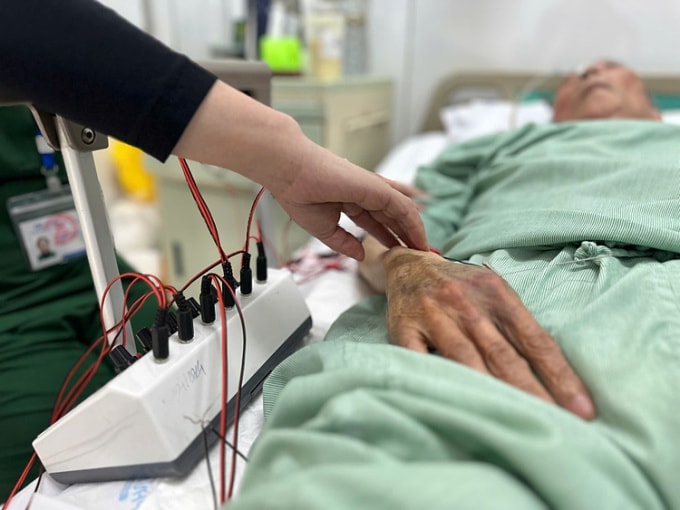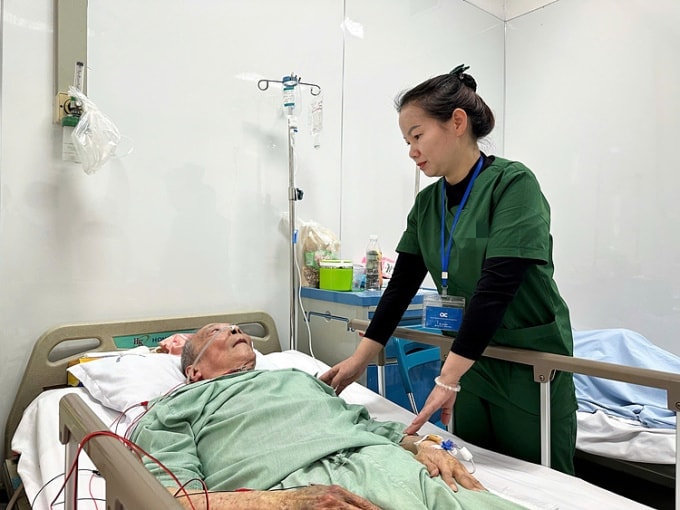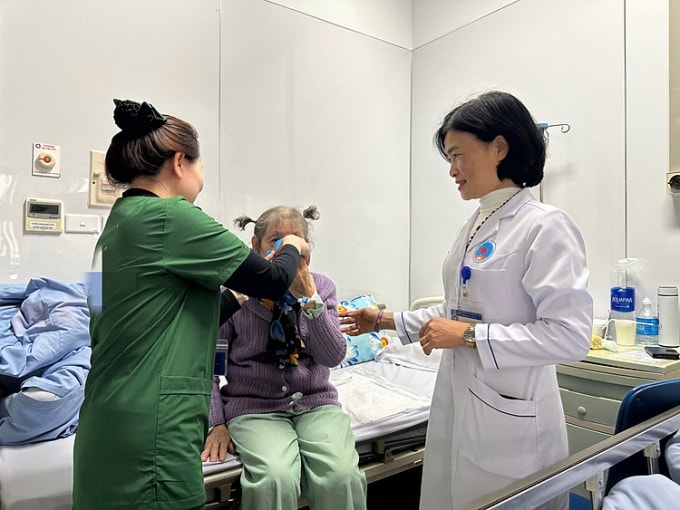At 3 a.m., the 78-year-old man had a coughing fit. Ms. Trieu Thi Lam had to sit up again and work with the nurse to tilt the patient to pat away the phlegm.

This is the 11th time that night that Lam has woken up in her room at the Friendship Hospital in Hanoi. Lam, 40, is a caregiver hired by the patient’s family through a service at the hospital. With a patient as dependent as the old man above, the family is paying Lam 650,000 VND/day.
The old man in Long Bien, suffering from severe stroke, was completely dependent, had to be fed through a tube, had a tracheostomy, and had pneumonia. At night, Lam took a nap at the foot of the hospital bed, but only for about 15-20 minutes before he stirred and coughed. As usual, every time the patient coughed, she would get up to wipe his mouth, rub his back, and coordinate with the nurse to pat and vibrate, suck the phlegm from the catheter, and then massage.
"Like tonight, I almost stayed up all night," said Ms. Lam.
Patients with severe stroke sequelae must have a tracheostomy and phlegm suction to clear the airways, otherwise it will be very dangerous, with the risk of phlegm stagnation and choking. However, the patient lies motionless, and two people are needed to turn the patient over, so Ms. Lam must coordinate with the nurse, tilt the patient, pat the phlegm, and suction the fluid. At the same time, she must always pay attention to the patient's facial expression and gestures, and immediately notify the doctor or nurse if there is a change in health.
Staying up all night to take care of the sick, during the day, Ms. Lam still has to ensure her health to continue doing other tasks such as personal hygiene, changing diapers, turning, wiping, and massaging.
According to a report by the Population and Family Research Agency in 2021, Vietnam has more than 4.3 million elderly people living alone or with people under 15 years old who need care support. The life expectancy of Vietnamese people has increased, but the quality of life of the elderly is still low due to illness. The average life expectancy is over 73, men have 8 years of living with illness and women have 11 years. On average, every elderly Vietnamese person has 3-5 diseases, mainly chronic diseases that require long-term treatment, even lifelong.
Friendship Hospital examines nearly 1,000 outpatients and treats about 800 inpatients a day, of which nearly 400 patients depend on caregivers. Half of these patients are cared for by their families, while the other half rely on the help of others, including home helpers hired by the hospital.
Ms. Lam is one of more than 100 patient care workers at the hospital, hired by relatives through a service model. She used to be a nurse, has medical expertise, has been trained in care and communication skills, and has over 5 years of experience. Ms. Lam believes that the price is completely worth the labor.
Also doing the same job as Ms. Lam, Ms. Hoa, 45 years old, in Thanh Hoa, is taking care of an 80-year-old woman who has had a stroke and is completely dependent on her. She said: "Night is the hardest time, I often can't sleep deeply, many nights I have to stay up all night."
Previously, she was on duty at the hospital with the old lady. After she was discharged from the hospital and went home to celebrate Tet, the family asked Hoa to take her home to take care of her. The old lady was seriously ill, with lung problems and frequent coughing, so she had to get up to help with phlegm suction, percussion, and turning her around every night, or when she was thirsty or went to the bathroom. This job is unbearable for those who are weak and impatient.
Ms. Hoa also provides psychological support, sharing, and spiritual encouragement. She recognizes that this job requires good health because you often stay up late, be diligent, meticulous, and not afraid of hardship. In addition, those who are afraid of dirt and lack tolerance cannot do it.
According to the hospital representative, in the past, families who wanted to hire a private caregiver were checked by the hospital, presented personal documents and signed a written agreement. However, in general, this method was difficult to manage. Many people did not fully understand the patient's condition, leading to failure to provide timely information to the doctor. They also lacked psychological knowledge and skills, so they were often angry, provided careless care, and were not encouraging or tolerant of the sick, causing the patient's spirit to decline further.

Specialist nurse I Tran Thi Lien Phuong, in charge of the nursing department at Friendship Hospital, said that elderly patients often have chronic diseases, suffer from many diseases at the same time, are prone to relapse, leaving serious complications and sequelae such as limited mobility, loss of self-care ability, and poor memory. Patients gradually become partially or completely dependent, so family members have a lot of difficulty in taking care of them. Some common diseases include cardiovascular disease, high blood pressure, stroke, diabetes, lipid metabolism disorders, kidney failure, musculoskeletal diseases, etc.
In cases of lifelong sequelae such as hemiplegia, caregivers are "extremely tired", "more than taking care of a child". Not to mention that patients who lie down for long periods of time are at risk of complications such as ulcers and pressure ulcers, requiring caregivers to have the skills to turn the patient frequently.
Many cases require experience in combining physical therapy with vibration to loosen phlegm and prevent respiratory infections, and continuous joint massage to prevent stiffness. In cases where a ventilator or oxygen machine is required, the caregiver must have knowledge and monitor the machine's operation, and replace the oxygen tank and nebulizer when caring at home.

A representative of a patient care service provider said that if the pressure of care is high, there will be a plan to change people so that the staff can rest. During Tet, the price is a little higher, but it is controlled through the hospital to avoid the situation of raising the price too high.
Many experts see a huge gap in the demand for human resources to care for the sick. On the other hand, Vietnam lacks nursing homes or elderly care centers, mainly concentrated in big cities. Most elderly people still rely on their families to care for them, but their children and grandchildren are increasingly less able to respond due to economic and time pressures.
Authorities need to have mechanisms to attract human resources to develop a long-term care system, provide financial support, health insurance, and invest in elderly care infrastructure.
HQ (according to VnExpress)